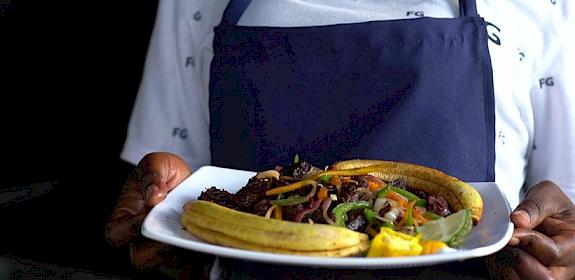TRAFFIC's Behavioural Change team celebrated with award on World Environment Day
5th June 2019, Edinburgh, Scotland—TRAFFIC team members working on Social and Behavioural Change Communications (SBCC), commemorated World Environment Day this year by delivering an award-winning paper and presentation, at the World Social Marketing Conference (WSMC)[1] in Edinburgh, Scotland.

In the context of a 40% rejection rate, TRAFFIC’s paper sharing case study information on the Chi initiative in Viet Nam had been accepted by the international peer review panel associated with the Conference, without any changes requested. It then went on to be awarded a “Highly Commended” certificate in the case study submissions category, the only such award made for that group.
Key conclusions in the paper included that communications aiming to raise awareness of the plight of the species alone do not necessarily resonate with the most prolific group of consumers in Viet Nam. This illustration of the so called “Intention-Behaviour”, or “Value-Action Gap”, was a theme that featured prominently across many of the presentations made at WSMC.
Additionally, findings such as that the Chi target audience is primarily informed by the views and beliefs of their social networks, family and friends, rather than by the facts of the chemical composition of rhino horn or concerns about the threat of extinction of a species, also resonated with other case studies, and reinforced the importance of social marketing and behavioural science approaches to achieving real and rapid change.
Considering that the CITES[1] Secretariat echoed these considerations in their pre-amble to TRAFFIC’s “Consultant’s Report”[2], prepared as part of the review of progress towards the CITES Demand Reduction Resolution (Resolution Conf. 17.4), delivering against CITES Decision 17.84:
“It is critical that Parties understand the difference between well-targeted demand reduction strategies through behaviour change and mass campaigns to raise awareness of the plight of endangered species and the various negative impacts of poaching and wildlife trafficking. Although both approaches have their merits, the former is more imperative in order to address the urgent needs.”
CITES Secretariat
Today TRAFFIC also launched two “Good Practice Guidelines” – Designing Effective Messages and Choosing the Right Messenger – for the SBCC Community of Practice for World Environment Day, 2019. These Guidelines followed the Expert Roundtable on “Messages and Messengers”, in Bangkok, Thailand on the 16th and 17th August 2018[3], and were co-produced by TRAFFIC with the Behavioural Insights Team (BIT)[4]. High demand for resources such as these Guidelines reflects the increasing interest across the conservation community in the application of behavioural science across a range of natural resource protection issues, including wildlife trade, as captured in the recent TRAFFIC Bulletin (Vol. 31, No. 1[5]).
The WSMC paper and presentation, and Messages and Messengers Good Practice Guidelines, will soon be complemented by a dedicated e-Course on embedding behavioural science in conservation communications, and in a behavioural change decision tree on similar themes. Further information regarding TRAFFIC’s work for the Community of Practice is available on the Wildlife Consumer Behaviour Change Toolkit, www.changewildlifeconsumers.org.
TRAFFIC’s participation in the WSMC and production of the Good Practice Guidelines, has been made possible through the generous support of USAID, through the Wildlife Trafficking Response, Assessment and Priority Setting (Wildlife TRAPS) project, with a contribution from the German Polifund project, implemented by GIZ on behalf of the German Federal Ministry for Economic Cooperation and Development (BMZ) and the German Federal Ministry for Environment, Nature Conservation and Nuclear Safety (BMU).
Notes:
[1] https://wsmconference.com/edinburgh-2019
[2] Convention on the International Trade in Endangered Species of Wild Fauna and Flora
[3] https://cites.org/sites/default/files/eng/cop/18/inf/E-CoP18-Inf-004.pdf
[4] https://www.traffic.org/news/mitigating-the-markets-for-illegal-wildlife-products-experts-review-effective-demand-reduction-messengers-and-messaging/
[5] https://www.bi.team/what-we-do/policy-areas/environment-sustainability/
[6] https://www.traffic.org/site/assets/files/12036/bulletin-31_1-final-web.pdf





